The British prime minister's 'stay alert' message has been cricitised by politicians and members of the public and caused tension with UK nations.
Boris Johnson has faced criticism from ordinary people as well as opposition politicians over his handling of the easing of lockdown restrictions in the UK.
 ADVERTISEMENT
ADVERTISEMENT
 ADVERTISEMENT
ADVERTISEMENT
At Monday's daily UK coronavirus briefing from Downing Street, the prime minister took a mix of questions from the press and members of the public.
One such question came from Pooja in Solihull, who focused on the PM's apparent vagueness over who should be returning to work this week. He was roundly criticised for not being clear enough in a statement given on Sunday night, with a 50-page document outlining the details only published on the government website the next day.
Asked by Pooja why he had been so vague about who could start back at work and which businesses can reopen this week, Johnson said: “Everybody has got the clarity of the message” - referring to the original government slogan of 'Stay home, protect the NHS, save lives'. He said people had followed that guidance, and stayed home.
Going forward this week, he added, if you can’t work from home you should talk to your employer about getting back to work. “It must be safe at work and safe to get there," he said. The new slogan is 'Stay alert, control the virus, save lives'.
'Wrong move could be a disaster'
With the UK coming down from the peak of infections and deaths from COVID-19, "the journey has reached most perilous moment where a wrong move could be a disaster,” the Prime Minister told Parliament earlier on Monday.
Following criticism directed at Boris Johnson's statement in Downing Street on Sunday night, which has caused widespread confusion, the PM laid out the plan at an appearance at the Commons.
He explained that:
People who cannot work from home should be encouraged to go to work if their business or organisation is allowed to operate
Guidance for businesses on making workplaces secure will be published
People should avoid public transport if possible
People should wear cloth face coverings in enclosed spaces
There are no limits on outdoors exercise, and you can rest in a park or play sports with members of your household or with one other person from another household as long as social distancing is observed
You can drive as far as you like to outdoor spaces
The UK could move to Phase 2 no earlier than 1 June, when there will be a phased reopening of shops, a return for some pupils to school
UK nations at odds with Johnson plan for England
Scotland's First Minister Nicola Sturgeon outlined her government's strategy concerning the lockdown on Monday -- and it contrasts sharply with Boris Johnson's plan for the UK.
She told a daily briefing it was "too risky" to change restrictions, and the message to people remains: "stay home". People are not being encouraged to go to work, she said. Johnson's "stay alert" instruction in his TV address on Sunday night applied to England and Wales, the first minister explained.
Sturgeon gave the latest figures for Scotland, saying five more people had died in the last 24-hour period, bringing the total number of COVID-19 deaths to 1,862.
Later the British government said there were 210 deaths from COVID-19 in the previous 24 hours in the UK as a whole, with that number including those inside and outside of hospitals.
At least 32,065 people have died in the UK, making it the second-worst hit country in the world after the US, according to currently available data.
Here is a summary of Monday's developments on the coronavirus pandemic from Europe and around the world:
Coronavirus infection rates will rise after lockdown rules relaxed, says French MP
Boris Johnson under fire for 'confused' lockdown strategy speech
Spain loosens restrictions further but prime minister warns of danger that virus could spread
Belgium, Czech Republic, Denmark, Greece, Norway, Switzerland and Ukraine also easing lockdowns to various degrees
More than 130 detained after protests against coronavirus restrictions in Germany
World Health Organization denies report of pressure to withhold information

 ${title}
${title}
Live ended
More than 80,000 deaths in USA
Johnson grilled on lockdown advice
210 deaths in UK, 65,337 tests in last 24 hours
NYC death toll could be thousands higher than reported, CDC says
That's because around 24,172 more people died between March 11 and May 2 than what researchers would expect for the season.
"The percentages of these excess deaths that occurred in persons infected with SARS-CoV-2 or resulted from indirect impacts of the pandemic are unknown and require further investigation," the CDC report said.
As of May 11, more than 19,000 people have died of COVID-19 in New York City.
France records 263 deaths in 24 hours due to coronavirus
There are currently 2,712 people in intensive care in France and 22,284 in hospital.
Meanwhile the country's constitutional council approved a law on the health emergency in France, while limiting two aspects of tracking coronavirus patients and isolating people.
Fewer than 1,000 patients in intensive care in Italy
There were 999 patients in intensive care in Italy on Monday, a first since March 10, said the country's civil protection authority.
On April 3, Italy reached a peak in the number of people in intensive care with 4,068 people, AFP reported.
The death toll was slightly higher on Monday, 179 compared with 165 the previous day.
Italy has a total of 30,739 deaths due to COVID-19 and at least 219,814 confirmed cases of the virus.
'We need to get our priorities right as we head to next phase of this fight', World Health Organisation says
The World Health Organisation warned people to stay vigilant as lockdowns begin to ease in many countries.
Preliminary serologic testing has shown that a small portion of the population has had coronavirus.
That means that there is a "large proportion of the population that remain susceptible", said WHO's technical lead Dr Maria Van Kerkhove.
WHO's Dr Mike Ryan added that the idea that countries with lax measures will reach herd immunity is a "dangerous calculation".
"This is a serious disease. This is public enemy number one," he said.
"We need to get our priorities right as we head to the next phase of this fight," Dr Ryan added.
People in hospital are also taking a long time to recover from coronavirus, especially those who have suffered from severe disease.
"People don't necessarily just bounce back to full health," said Dr Ryan, who is the director of the organisation's health emergencies programme, said in response to a question about recovery time.
The WHO said the current breakdown of cases shows that around 40% of patients have mild symptoms and 40% have moderate symptoms (including pneumonia) but will not need hospitalisation. Another 15% are exhibiting severe disease and 5% critical, requiring ICU and ventilatory support.
Boris Johnson lays out plan for the UK
- People who cannot work from home should be encouraged to go to work if their business or organisation is allowed to operate
- Guidance for businesses on making workplaces secure will be published
- People should avoid public transport if possible
- People should wear cloth face coverings in enclosed spaces
- There are no limits on outdoors exercise, and you can rest in a park or play sports with members of your household or with one other person from another household as long as social distancing is observed
- You can drive as far as you like to outdoor spaces
- The UK could move to Phase 2 no earlier than 1 June, when there will be a phased reopening of shops, a return for some pupils to school
Watch live: Boris Johnson addresses Commons after confusing statement
How European nations are planning to come out of lockdown
Sturgeon reiterates 'stay home' message for Scotland
Scotland's First Minister Nicola Sturgeon has been outlining her government's strategy concerning the lockdown -- and it contrasts sharply with Boris Johnson's plan for the UK.
She told a daily briefing it was "too risky" to change restrictions, and the message to people remains: "stay home". People are not being encouraged to go to work, she said. Johnson's "stay alert" instruction in his TV address on Sunday night applied to England and Wales, the first minister explained.
Boris Johnson said that under a "change of emphasis", if people could not work from home, they should be encouraged to travel to their workplaces. The UK prime minister added that people would also be encouraged to take "more and even unlimited amounts of outdoor exercise".
Sturgeon gave the latest figures for Scotland, saying five more people had died in the last 24-hour period, bringing the total number of COVID-19 deaths to 1,862.
More retail stores in Greece now allowed to reopen
Some shops in Greece were allowed to reopen on Monday as the nation entered its second phase of the lockdown.
While shopping malls and department stores remain shut, all other retail businesses, including clothing, hardware and beauty product stores, were reopening Monday morning, with social distancing measures applying to prevent the spread of the new coronavirus.
Stores must limit the number of customers inside at any one time depending on the size of the property.
Greece imposed a lockdown early in its outbreak, a move that has been credited with keeping the number of deaths and critically ill at low levels.
On Sunday, health authorities announced no new deaths and just six new confirmed infections, keeping the death toll at just over 150 and the confirmed infections to more than 2,700. Greece has a population of almost 11 million. (AP)
Brexit talks to go ahead this week despite COVID-19 pandemic
Masks given out to Paris commuters
Coronavirus infection rates will rise after lockdown rules relaxed - French MP
Bruno Bonnell, from Emmanuel Macron’s ruling La République En Marche, told Good Morning Europe that it's a case of trying to balance the needs of the economy with public safety.
He adds that if infection rates rise too high, France may have to impose a further period of confinement. Watch the interview:
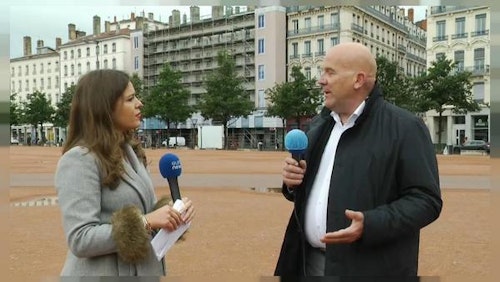
French MP tells Euronews there is 'no doubt' COVID-19 rates to rise
euronewsBruno Bonnell, from Emmanuel Macron’s ruling La République En Marche, said it was a case of trying to 'find a balance'Boris Johnson under fire for 'confused' lockdown strategy speech
Lots of criticism of the British prime minister's TV address last night on easing the lockdown (see below).
"Stay at home" was a clear message but what does the new slogan "Stay alert" mean in practice? Here's our report on the latest reaction:
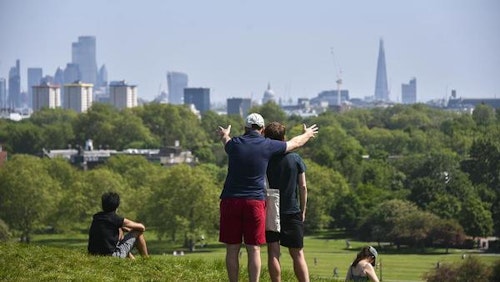
Boris Johnson under fire for 'confused' lockdown strategy speech
euronewsNo longer 'Stay at Home', the UK government's advice is now 'Stay Alert'. Critics say that what that actually means isn't clear.Sweden 'could have acted faster' - top official
A top Swedish official says lessons should be learned from tackling the coronavirus pandemic and Sweden could have acted “a little faster.”
Dan Eliasson, head of Sweden’s Civil Contingencies Agency told Swedish radio Monday that “when major crises occur, you will always look at it afterward. So comes the question, did we react fast enough?”
Swedish media in recent weeks have reported cases where retirement homes have seen a large death toll.
The Scandinavian country has taken a relatively soft approach that has caught international attention. Large gatherings were banned but restaurants and schools for younger children have stayed open. The government has urged social distancing, and Swedes have largely complied.
The country has reported more than 3,175 fatalities and 90% of those who had died as of April 28 were above the age of 70, according to official figures. Half were nursing home residents, and another quarter were receiving care at home.
Health Minister Lena Hallengren last month told Swedish television that “we failed to protect our elderly. That’s really serious and a failure for society as a whole. We have to learn from this.” (with AP)
Denmark and Norway take further steps to ease lockdowns
A quick look at the latest developments in Scandinavia.
Denmark is opening up shopping centres -- under strict social distancing rules -- as phase two of its lockdown easing comes into play.
The country began lifting constraints after Easter, allowing small businesses to reopen, as well as nurseries and primary schools.
Norway is allowing schools for 11 to 16-year-olds to reopen from today. Private gatherings of up to 20 people are now permitted, and public events of up to 50 subject to authorisation.
The government plans to ease restrictions further in stages, removing the last remaining measures by mid-July.
Belgium relaxes lockdown, opens shops under strict conditions
Belgium is taking a major step in relaxing its coronavirus lockdown by opening shops under strict conditions.
Even still, public transport in Brussels has been hit by a strike because bus drivers don't feel safe under the current virus precautions.
Authorities on Sunday permitted people to start meeting with four close relatives or friends, allowing many families to celebrate a restricted Mother’s Day. (with AP)
England and Wales police: 'we need clear guidance not loose rules'
Strong stuff from the Police Federation in England and Wales this morning in response to Boris Johnson's TV address on the new guidance.
Police work "must be based on crystal clear guidance, not loose rules that are left open to interpretation", it says.
Full statement here:
Euronews live: special edition of Good Morning Europe
Watch Euronews live for special coverage from Lyon this morning as France eases its lockdown:
UK 'Stay Alert' message 'isn't clear enough' - Starmer
The leader of the main opposition Labour Party Sir Keir Starmer says there are contradictions in Boris Johnson's message and the government has "gaps to make up".
Criticising the prime minister's TV address last night, he claims there are different messages in England compared to Scotland and Wales:
Starved of culture, Czechs hold drive-in festival
More restrictions are being eased in the Czech Republic (see below). Concert halls, cinemas and theatres in the Czech Republic have been closed since mid-March because of social distancing rules.
So a Prague festival producer invited people to come by car to his event at the weekend:
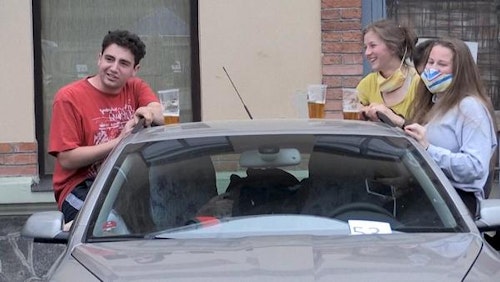
Starved for culture, Czechs hold drive-in festival
euronewsA Prague festival producer said the coronavirus pandemic has forced him turn his festival into a drive-in event.Lockdown eased further in Czech Republic
Restrictions have been lifted gradually since April 24, and from today outdoor areas of bars and restaurants will be allowed to re-open.
How has the country managed to escape the worst of COVID-19?
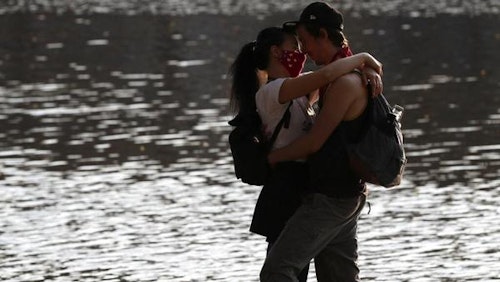
Czechs so far avoid worst of COVID-19 despite lenient lockdown
euronewsThe Czech Republic hasn't been hit as hard by COVID-19 as some other countries, despite lockdown leniency over outdoor life.Boris Johnson: 'We will not hesitate to put on the brakes'
The UK Prime Minister outlined a roadmap for a modest lifting of restrictions in a TV address on Sunday night.
But there's confusion over what the new slogan "Stay Alert" -- which replaces "Stay at home" -- actually means.
Meanwhile Scotland, Wales and Northern Ireland appear to be moving at a different pace from England.
Here's our report on what the PM had to say:
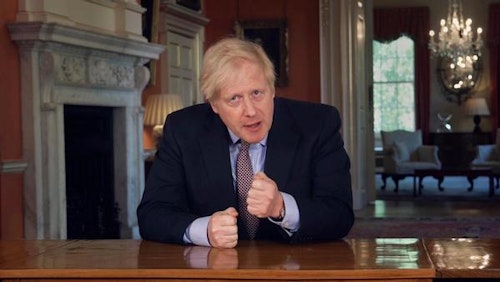
PM Johnson: 'It is not the time to simply end the lockdown this week'
euronewsJohnson said that starting Wednesday, a restriction limiting outdoor exercise to once a day will be lifted and that people will be able to take “unlimited amounts.”China reports new mini-cluster in Wuhan
China reported another rise in coronavirus cases on Monday, as the government reminded people to step up personal protection against the virus.
Of the 17 new cases, seven were listed as imported, while five were in the city of Wuhan, the epicenter of the pandemic, where a strict lockdown was lifted last month.
Health authorities have renewed calls for people to avoid social gatherings and to seek treatment if they show symptoms.
The National Health Commission said there had been no new deaths, extending that record for almost a month, and 141 people remained in hospital in treatment.
China has recorded a total of 4,633 deaths from the virus among 82,918 cases of COVID-19.(with AP).
France partially eases lockdown but Paris will be under stricter controls
Today is the long-awaited day in France where coronavirus restrictions are being eased -- but it's not the same picture in all parts of the country.
Paris and parts of the east and northeast, where contagion rates are higher, are flagged "red"... Here's our report on what the measures mean:

Paris will be under stricter controls when France's lockdown is lifted
euronewsCOVID-19 is still circulating in Paris and lockdown will be eased at a slower pace in the French capitalSeveral European countries take first tentative steps out of lockdown
Monday sees the first easing of restrictions in France, where shops and most primary schools will reopen.
Spain, began easing measures a week ago, will see a further lifting of restrictions in a phased approach around the country.
Lockdowns are also being partially eased in Belgium, the Czech Republic, Greece, Switzerland and Ukraine.
But in the UK, the steps outlined by Prime Minister Boris Johnson on Sunday night are much more limited.
Here's our overview from the weekend:
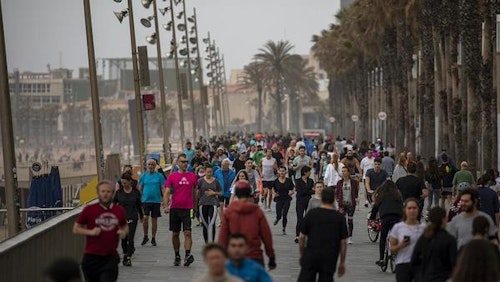
France, Spain and UK prepare to ease lockdowns starting Monday
euronewsSpain's Prime Minister Pedro Sánchez joined other leaders in warning that the spread of the virus could ramp up again and new restrictions could be re-imposed.Good morning, this is Alasdair Sandford with the latest on the pandemic from Europe and around the world.











